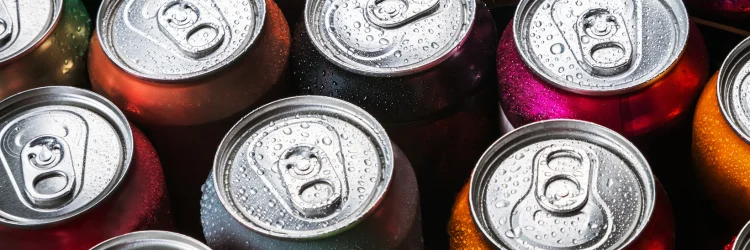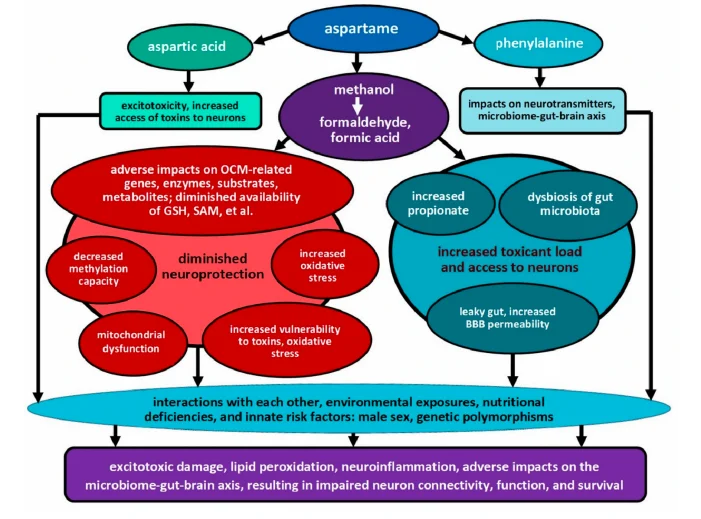- 39 New London Turnpike Suite 120 Glastonbury, CT 06033

Daily Early-Life Exposures to Diet Soda and Aspartame are Associated with Autism in Males:
A Case-Control Study
Nutrients
August 29, 2023, Vol. 15; No. 17; Article 3772
Sharon Parten Fowler, David Gimeno Ruiz de Porras, Michael D. Swartz, Paula Stigler Granados, Lynne Parsons Heilbrun, Raymond F. Palmer: from the University of Texas Health Science Center. This study cites 121 references.
This is the first study to specifically examine the associations between offspring autism status and the daily maternal intake of diet soda (DS) and aspartame (ASP) during pregnancy/breastfeeding.
A total of 356 children were included in the analyses, adjusted for child’s ethnicity, mother’s education, and household income.
Maternal intake of ≥12 ounces (1 can) of DS/day during pregnancy/breastfeeding was the primary exposure variable.
The authors hypothesized that gestational/early-life exposure to ≥1 DS/day (DS-early) or aspartame (ASP-early: ≥177 mg/day) increases autism risk.
KEY POINTS FROM THIS ARTICLE:
1) Aspartame is the leading sweetener in U.S. diet sodas (DS).
2) Aspartame has been reported to cause neurological problems in some users.
3) “In prospective studies, the offspring of mothers who consumed diet sodas/beverages (DSB) daily during pregnancy experienced increased health problems.”
4) “Our findings contribute to the growing literature raising concerns about potential offspring harm from maternal DSB/aspartame intake in pregnancy.” [Key Point]
5) “Over the past 40 years, the prevalence of diagnosed autism spectrum disorder (ASD) in the U.S. has dramatically risen, from fewer than 0.3 per 1000 children diagnosed with autism before 1980 to 27.6 per 1000 children diagnosed with ASD in 2020.” [Wow!!]
6) “The degree to which ASD diagnoses have risen during this time highlights the potential role of non-genetic influences, including early prenatal exposures to heavy metals, organophosphate pesticides, and other environmental toxins, in offspring autism risk.”
7) “Maternal diet during pregnancy and breastfeeding represents an important additional non-genetic influence on offspring autism risk.”
8) Maternal intake of prenatal vitamins, folic acid, omega-3 fatty acids, and vitamin D reduce offspring autism risk.
9) Maternal dietary intake of methanol during pregnancy increases the risk of autism in their offspring (methanol is not found in alcoholic beverages, which contain ethanol; methanol is found in aspartame).
10) “In 1981, the U.S. Food and Drug Administration (FDA) approved the use of aspartame as a tabletop sweetener and, in 1983, as an ingredient in diet sodas (DS) and other products.”
11) “Aspartame is metabolized in the intestine into aspartic acid, an excitatory neurotransmitter; phenylalanine, which is involved in neurotransmitter regulation; and methanol, the metabolites of which include formaldehyde, formate, and other toxins.”
12) Aspartame intake has been associated with long-term health problems.
13) The risk of autism is four times higher in boys than in girls.
14) Intake of the three leading non-nutritive sweeteners (NNS) are:
15) Results
16) “Diet sodas and other diet beverages (DSB) are leading vehicles of aspartame intake in the U.S.”
17) Prior studies have shown that maternal aspartame is associated with adverse neurological reactions, increased headache, problems with nervousness/irritability, depression, memory, spatial orientation, and increase in major depression.
18) Between 24% and 30% of pregnant women use either NNSs in or DS/DSB during their pregnancies.
19) One of the most frequently reported impacts of aspartame consumption is a decrease in the availability of GSH.
20) Conclusions

We have reviewed these articles that support the adverseness of the consumption of aspartame:
Article Review 4-13:
Diet Soft Drink Consumption is Associated with an Increased Risk of Vascular Events in the Northern Manhattan Study
Journal of General Internal Medicine
Article Review 15-13:
Fueling the Obesity Epidemic? Artificially Sweetened Beverage Use and Long-term Weight Gain
Obesity
Article Review 25-15:
Gain Weight by “Going Diet?” Artificial Sweeteners and the Neurobiology of Sugar Cravings
Yale Journal of Biology and Medicine
Article Review 28-15:
Consumption of Artificial Sweetener– and Sugar-containing Soda and Risk of Lymphoma and Leukemia in Men and Women
American Journal of Clinical Nutrition
Article Review 16-17:
Sugar- and Artificially Sweetened Beverages and the Risks of Incident Stroke and Dementia
Stroke

39 New London Turnpike Suite 120
Glastonbury, CT 06033
